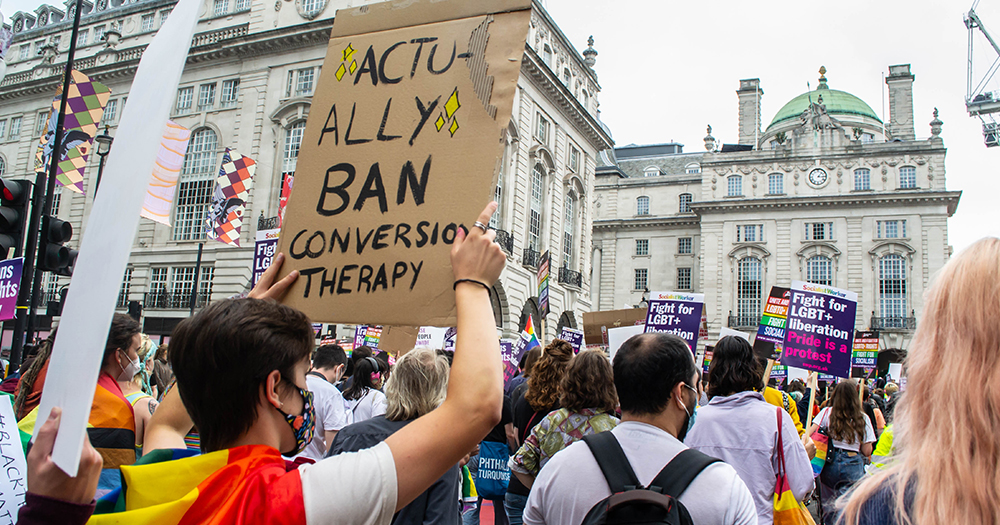Content warning: mentions of homophobia, transphobia and conversion practices.
A new study published yesterday, May 14, investigated conversion practices in the Northern Irish context, finding an urgent need to introduce a ban. The research also found that conversion practices are delivered in faith organisations, mental health services and youth clubs.
Also known as so-called “conversion therapy”, the practices aim to change or suppress a person’s sexual orientation or gender identity, based on the belief that being heterosexual and cisgender is the only ‘right’ option and others are flawed or “broken”. Such practices can take a variety of forms, ranging from pseudo-psychological treatments to more extreme acts involving physical and sexual violence.
Titled A Study of Conversion Practices in Northern Ireland, the new research was commissioned by Northern Irish LGBTQ+ groups Cara-Friend, HEReNI, The Rainbow Project and TransgenderNI and funded by the Department for Communities (DFC). It explores aspects of conversion practices in the region, including the routes through which they are delivered, the context and the impact they have on survivors.
Delighted by the overwhelmingly positive response to our research launch today, which delved into experiences of conversion practices by ten individuals within the last decade.
The report recommends a ban on conversion practices in Northern Ireland.https://t.co/OhxvslpnqQ
— The Rainbow Project (@TRPNI) May 14, 2024
Researchers from Ulster University and Queen’s University, Belfast conducted qualitative interviews with 10 participants who had experienced conversion practices in Northern Ireland in the past decade.
The research found that the majority of participants (seven out of 10) had experienced such practices within a faith organisation. Some of them were referred by teachers or family members. One of the participants recalled being subjected to “exorcisms” that went on for hours.
Another participant, a non-binary person, said that sometimes they were locked into a dark closet as part of the conversion practices.
“Sometimes they would lock me in there or they would lock my friends in there. There wasn’t a light in that closet,” they shared.
“You would just be left in there for a couple of hours until they deemed that you had your quiet, peaceful contemplation. And then they would bring you out and they say, that’s what it’s going to be like in hell.”
Two other participants said they experienced conversion practices through mental health services. One of them shared how having to go through the process prevented them from accessing the mental health support they needed.
The research also found that, while many individuals consent to such conversion practices, the consent takes place in situations where there is heavy stigmatisation against LGBTQ+ people and an imbalance of power. One of the participants, a gay man, shared: “The reason that I chose to do that was because I was extremely terrified all the time, just constant fear that my community were going to find out about my secret, that I was going to lose everyone that I cared about, that my family would disown me.
“And I just could not perceive a life for myself outside of the community that I grew up in. I didn’t know the rest of the world. I didn’t know the way other people thought,” he added.
For these reasons, all the participants were unanimous in recommending a ban on conversion practices, with some saying that it was impossible to consent to such practices freely.
Did you know that conversion practices are still conducted in Northern Ireland? #idahobit2024 pic.twitter.com/T4nZNZNKr3
— Cara-Friend (@CaraFriendNI) May 14, 2024
Director of Cara-Friend Steve Williamson commented on the findings of the Northern Irish study, saying, “Children and young people, many of whom are faced with intolerant or unsupportive parents and family members, are particularly at risk of being funneled into conversion practices.
“These practices do untold harm to young people and can leave them with life-long trauma – trauma which can be avoided if the Executive and Assembly step up and deliver a comprehensive and inclusive ban,” Williamson added.
© 2024 GCN (Gay Community News). All rights reserved.
Support GCN
GCN is a free, vital resource for Ireland’s LGBTQ+ community since 1988.
GCN is a trading name of National LGBT Federation CLG, a registered charity - Charity Number: 20034580.
GCN relies on the generous support of the community and allies to sustain the crucial work that we do. Producing GCN is costly, and, in an industry which has been hugely impacted by rising costs, we need your support to help sustain and grow this vital resource.
Supporting GCN for as little as €1.99 per month will help us continue our work as Ireland’s free, independent LGBTQ+ media.
